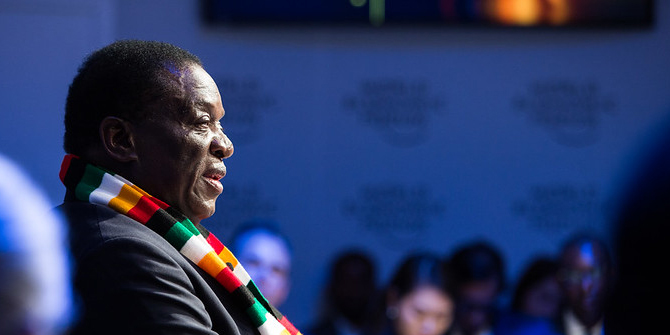As part of a series on development practice in Africa, we interview key African stakeholders working on the continent to drive development across a number of sectors. In this first interview Charles Dhewa, CEO of Knowledge Transfer Africa, discusses the role of informal markets in developing the African continent, focussed on Zimbabwe. Interview by MSc Development Management student Temi Phyllis Pratt.
Charles Dhewa grew up in Gokwe, North district of Zimbabwe, where farming remains a source of livelihood. He is the Chief Executive Officer of Knowledge Transfer Africa, which he founded in 2006 after realising that agricultural value chain actors in developing countries needed a knowledge broker – to keep reminding them of what they could be forgetting and under-estimating.
Working at the intersection of formal and informal agricultural markets, his organisation has set up a fluid knowledge and information platform called eMKambo, which tracks trends and ensures agricultural value chains are driven by knowledge, technology and innovation. He is always clarifying opportunities and influencing policy through his thought leadership blog, and he holds an MPhil in Information & Knowledge Management from Stellenbosch University, South Africa.
TPP: Tell us about your organisation Knowledge Transfer Africa?
CD: I work with informal food markets primarily in Zimbabwe but also across the African continent. We provide support to these market systems in a variety of ways, including, raising their profile among policy makers. We interact with these markets and support them in collecting information that supports growth.
At the crux our work is to support the development of the African continent through these informal food markets, supporting the creation and development of a domestic consumer market. This will make the development home-grown and well-tailored to meet the needs of people on the continent.
TPP: What is the role of informal markets in development?
CD: Informal markets are a key characteristic of many African economies, even though we sometimes try (as a continent) to deny their full existence or potential. They meet the needs of ordinary people on the continent. This is especially true of the traditional African Food Market (Like Mbare in Zimbabwe). In the context of food and nutrition needs, they are an affordable alternative to big formal supermarkets.
I see them as institutions. The rules of engagement allow accessibility to many people. These rules tend to be unwritten, but as you participate, you know what is going on and also become acquainted with the oral traditions that are a key feature of these markets.
They are a connection between rural and urban communities in most African countries. In the case of the traditional African market, it is an ‘agency’ through which culture and knowledge are preserved. As an observer, you see farmers coming in from their farms, which most of the time are in rural areas, to sell products, perhaps to the market women who then sell to ordinary consumers.
Informal food markets are an excellent way to know about African culture. They are a window into history, language and knowledge systems. They are more than just buying and selling spaces. They are the centre of informal knowledge ecosystems, and these systems hold vital information on histories of people, tribes, language, culture, commodity trading approaches etc.
In the case of Zimbabwe, we have Mukando, which is a method through which people in communities save money. It is an indigenous financial mechanism that helps people save or gain what they need to meet their financial needs. Sometimes people are involved in it through a trade by batter system, knowledge exchange et cetera.
I think that these informal markets, especially informal food markets, are a key part of the African development story and one we really need to take advantage of if we wish to develop as a continent. You will find that, even when there are global financial crises, these informal markets keep going, and this is because resilience has become a key part of how they function.
TPP: What role do these markets play in the Economic Development of Zimbabwe?
CD: I think these informal markets play a role in helping ordinary people earn their own income. I see people who are able to earn money more easily through these markets than compared to government jobs or the formalised export market. They are democratic spaces and play a key role in economic justice in Zimbabwe. Again, this is because the rules of engagement are accessible to everyone.
Controversially, people who participate in these markets pay little to no tax. I am of the opinion that this is ok, because these people tend to be at the bottom of the economic pyramid and extracting too much money from them in the name of taxes can do more harm than good. They are also a source of food security and even, in times of droughts, some markets still do function.
Many processing companies and big corporates have collapsed in Zimbabwe, however the informal food market is still active. As a consumer, you have more choice in the informal food markets, and we are finding that, where some farmers in Zimbabwe would traditionally take their products to the established supermarket, they are actually now bringing them to the local open informal food markets because demand is high. It is an open mass-market and functions as an open auction market.
I think that the informal food markets in Zimbabwe can be leveraged to re-package Zimbabwe’s present economic opportunities that will develop the country. We are rich in nutritious and exotic foods (for example Baobab) and our foods are organic and healthy.
TPP: What are your thoughts on formalisation?
CD: Sometimes when we formalise we can kill innovation and inadvertently shut people out. I am not against formalisation, but we should be careful not to formalise sectors just for the sake of it. It should be done carefully and in a phased-approach. In this instance, there is opportunity to use technology as an enabling tool or bridge which can connect both the formal and informal economy.
TPP: Finally, what is your vision for the future of Knowledge Transfer Africa and its role in informal economies on the African continent?
CD: I am immensely proud of the work we have done thus far in advocating for the value of the informal economy in Africa. Specific to Zimbabwe, our work has attracted research interests from international organisations and research institutes who wish to understand the fabric of the informal markets in Africa and the value of our knowledge systems. My vision for Knowledge Transfer Africa is we will continue to play a leading role in placing African knowledge at the centre of building home-grown African economies.
My role will be to continuously provide evidence proving that African informal economies are the real commonwealth for Africans in terms of economic prosperity, food security, culture, natural resources and relevant knowledge.
This post was first published on the LSE Department of International Development blog.
Photo: Mbare market, Zimbabwe. Credit: Knowledge Transfer Africa





